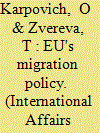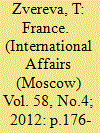|
|
|
Sort Order |
|
|
|
Items / Page
|
|
|
|
|
|
|
| Srl | Item |
| 1 |
ID:
182910


|
|
|
|
|
| Summary/Abstract |
THE development of a common EU migration policy and the approval of the new Pact on Migration and Asylum, proposed by the European Commission (EC) on September 23, 2020, is one of the most important tasks before the EC in 2021 [9]. But even if adopted, the pact would hardly be a breakthrough in efforts to solve the migration problems besetting the EU. To prove this point, we will examine the reasons for the European Commission's continued close attention to migration issues, the nature of the new proposals, and how they are perceived by politicians and the public in EU member states...
|
|
|
|
|
|
|
|
|
|
|
|
|
|
|
|
| 2 |
ID:
117378


|
|
|
|
|
| Publication |
2012.
|
| Summary/Abstract |
IN FRANCE, presidential campaigns and elections are always impressive and memorable events, the results of which extend for the next five years. No wonder, the public and the political class alike try to reassess the realities in an effort to arrive at more or less clear ideas on the key issues of the country's external and internal policies. The president is elected by direct general vote; each of the French citizens over 18 has the right to vote and, therefore, determine the outcome. This explains the high legitimacy of the president who enjoys wide powers, especially in foreign policy, under the Constitution of the Fifth Republic. People prefer charismatic politicians and brilliant personalities yet the programs of the contenders are no less important. In other words, the future of the country, at least for the next five years, depends on people's vote.
|
|
|
|
|
|
|
|
|
|
|
|
|
|
|
|
| 3 |
ID:
107100


|
|
|
|
|
| Publication |
2011.
|
| Summary/Abstract |
THE ONGOING UNREST IN ARAB COUNTRIES has been at the center of international attention for months. The "Arab spring" has a different color in each Middle Eastern and North African country. Nevertheless, the causes of crisis are similar in each country. They include unsolved domestic problems such as the lack of legal and clear mechanisms of power rotation that would be accepted by society; economic and political stagnation; poverty (absolute or relative) of the overwhelming majority of the population despite the enormous incomes of the political elite; corruption; and unemployment. These crises are interdependent to a certain extent, which has led people to compare them to a "domino effect.
|
|
|
|
|
|
|
|
|
|
|
|
|
|
|
|
| 4 |
ID:
102799


|
|
|
|
|
| Publication |
2011.
|
| Summary/Abstract |
THE ROOTS OF RELATIONS between France and Russia, countries that link the West and the East of the European continent, go deep into history. Since the beginning of the 18th century, the relations between the two states were becoming increasingly stable. So today we have every reason to say that Russia and France have been tied by strong knots of cooperation for 300 years now.
Relations between these two great European nations have not always been trouble-free. The countries now drew closer, now moved apart from each other under the influence of geopolitics, ideology, the economy, and many other circumstances. But for three centuries now, the cultural commonality felt by the two civilizations has been prompting them to converge.
|
|
|
|
|
|
|
|
|
|
|
|
|
|
|
|
|
|
|
|
|